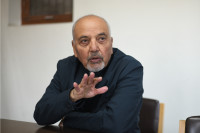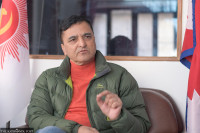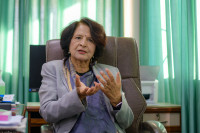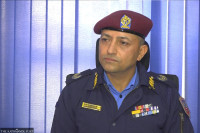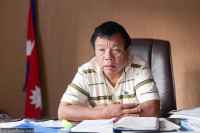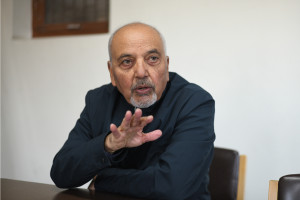Interviews
The voices of children and young people must be heard
Dr Dereje Wordofa, president of SOS Children Village International, on the organsation's attempts to provide child care and the need for intervention at various levels to tackle gender-based violence, child marriage, and abuse of children.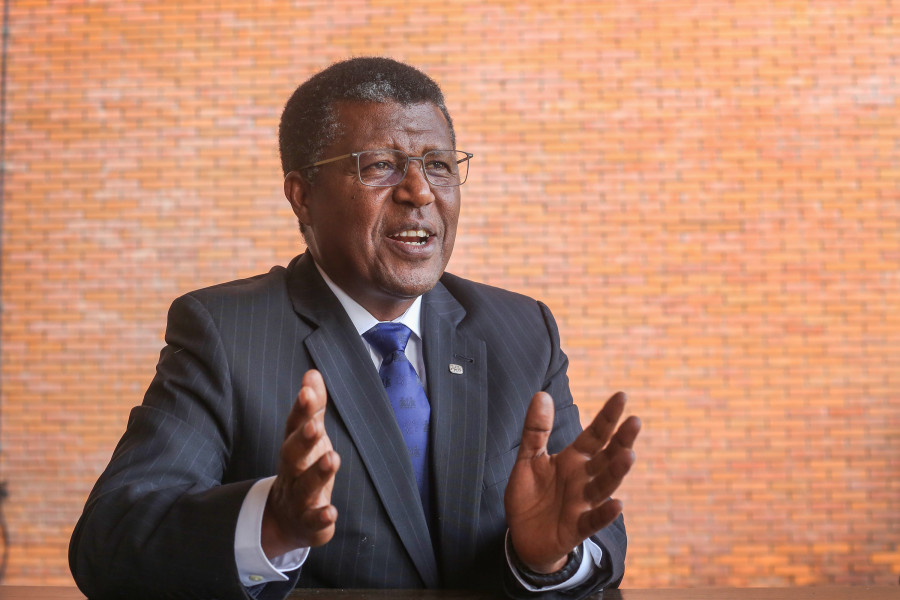
Mimamsha Dhungel
Dr Dereje Wordofa is the fourth president of SOS Children’s Villages in the organisation’s 70-year-old history. Wordofa, who has also served as the Assistant Secretary General of the UN Population Fund, took the helm of the SOS organisation in June 2021. In this interview with the Post’s Mimamsha Dhungel, Wordofa talks about SOS Children Village International’s attempts to provide child care, protection and advocacy and the need for intervention at various levels to tackle gender-based violence, child marriage and abuse of children. Wordofa was in Nepal for a visit in the first week of March.
How does SOS ensure the safety and well-being of the children in its care in areas affected by conflict? How can we help children who have been victims of early childhood abuse or gender-based violence?
Man-made or natural disasters make children vulnerable. It is vital to keep children in a family whether they are affected by armed conflict, poverty, familial violence, mental health problems, or subsequent shocks. We believe that children can grow up in the finest possible environment when their biological parents raise them. The core principle is strengthening the family. However, we intervene to protect the children in circumstances where the child’s biological parents may have died prematurely during conflicts or natural disasters, leaving no one to care for the child. Protection entails making sure the child is safe and, if applicable, that they’ll be living with their siblings. For them to remain together, the family must have a dependable and trustworthy caregiver, expert care consultants, and supporters who can offer guidance.
Advocacy is equally important. Children are greatly impacted by poverty, violent conflicts, and natural disasters like the earthquake that struck Nepal a few years ago. But we cannot reach out to all of them. So the government must ensure that there are financial resources set aside, legislations and policies that recognise children who lack or are at risk of losing parental care. All levels of government and non-governmental organisations and other community-based institutions could protect families and provide for children if there are laws, policies and budgets separated for such cases.
One example of effective advocacy reflected in SOS’s work is the organisation’s involvement in discussions with the Nepal government about the Children’s Act to better the defence for children without parental care. The Children’s Act was passed in 2018 in Nepal and is in line with the UN Convention on the Rights of the Child as well as the UN guidelines for alternative care. These are critical international instruments for addressing Nepal and the Nepali government. The law is now in effect. The measure will help not only children in the SOS care system but all children in Nepal.
Could you provide us with some background on SOS’ work model towards women’s empowerment and child protection?
Our programmes address gender inequality, violence against women, and gender-based violence because these are issues that lead to child vulnerability through early marriages and sexual abuse. As a result, we invest in sex education to ensure that young children understand their sexual and reproductive health and rights. We make certain that youngsters learn what is right and wrong at an early age so that they can make rational judgments. We raise awareness about child marriage and early marriage in order to decrease child abandonment. We can avoid unplanned pregnancies by investing in these areas.
Another goal of this is to keep girls in school. Our objectives are to have children stay in school, protect them from sexual violence, understand their bodies, and let them make decisions about when to get married and how many children to have.
When girls stay within the education system it gives them the freedom to become independent and empowered and improve their economic well-being. We want to support digital innovation and technology for gender equality. We want to digitise our programmes to incorporate the internet and various other technologies alongside this infrastructure so that children can access knowledge about vital ingrained equality.
During the COVID lockdown, we accelerated this approach. Our aim at the moment is to ensure that digitisation reaches all children, adults, and families. SOS is dedicated to ending all types of violence, Sexual violence affects one in three women, and gender-based violence affects more than 700 million people worldwide. SOS has made investments to help alleviate this across Asia, including Nepal, Latin America, and Africa.
How does SOS navigate through cultural attitudes and traditions that may perpetuate gender inequality, and how have you dealt with it? Violence and child marriage are often social-cultural constructs. How do we overcome this?
We take a multifaceted approach. The beauty of our work is that we don’t work alone. We work primarily with communities. So, community leaders and phase leaders play very important roles in society in either perpetuating what is wrong or transforming the culture or norms within a community. We work with organisations that play a very important role in the sphere of commerce, economy and social development. In the beginning, we work with the government because we need to put policies, laws and budgets in place that make violence and early marriage illegal or wrong.
Education is extremely crucial in this field. Children must be taught that everyone is equal and that violence against women and girls and early marriage is unacceptable. If children grow up in that setting, we can create a lot more peaceful society for everyone, a culture that values girls and children, a norm that prioritises the girl child in terms of education and support. When a girl receives an education, her family and society benefit. We are working to strengthen families with such a motto.
Increasing money is vital, but so is keeping the peace. A culture where families respect and show affection to one another must be developed. Strong and cohesive families lead to strong and cohesive communities, which in turn lead to stronger countries. If we keep making direct investments in boosting families and fostering inter-family harmony, the world will be a better place.
How do we encourage a child to continue dreaming when there is so much unrest, violence, and mayhem happening around us?
When a traumatised child comes into contact with any care system, it implies that the youngster has experienced a great deal at a young age. First and foremost, psychosocial support for trauma recovery must be prioritised. It is just as vital as providing good food, a safe place to sleep, clean living circumstances, and cleanliness. It is critical to ensure the entire structure’s safety for the child to rebuild confidence. It is crucial to create a supportive environment where the children can go out and play and attend school.
You need devoted individuals who are committed to safeguarding children and their dreams. Some professional caregivers at SOS have been caring for the children for 30 years and will keep doing it until they retire. Their bond with the child is based on mutual love, trust, and respect. They watch as the child grows from infancy to toddlerhood, adolescence, and young adulthood. The connection is everlasting. There are many inspiring success stories because of this relationship, which allows the children to dream and strive toward realising those aspirations.
You met Prime Minister Pushpa Kamal Dahal on your visit to Nepal. What issues were on the agenda?
It was a pleasure and a great honour to meet the Prime Minister of Nepal. He was an excellent host, and he recognised SOS’s long-term efforts. I raised three issues from my side—the need to promote child and youth participation in the government’s efforts to enact laws and policies that will advance any progress toward improving the lives of young people and children. Second is the importance of working together and expanding on the existing collaboration. We collaborate with the Ministry of Children and Women’s Rights and with the government for the Children’s Act.
I proposed an idea to strengthen the collaboration further. The Children's Act, which was passed by parliament in 2018, will take a long time to be implemented. As a result, all stakeholders, including ministries and cabinets, must collaborate. We need to expand to different provinces and communities. Laws are important, but putting them into action necessitates additional effort. We are all in this together. The government is committed to achieving sustainable development goals and investing in healthcare and education, both of which are critical for children. We all share a desire to improve.
What can we do as individuals and as social entities to help this larger cause?
The challenges we face in our families, communities, and nations can be enormous. However, taking small steps to address these issues helps. Hermann Gmeriner, a single man, founded this organisation. It is now in 138 countries and is a global movement. If there is anyone out there, whether a student, a corporate leader, a professional, or a wealthy individual and if they have financial resources or skills, they can share them. They can be a voice for children who are voiceless or invisible. So, people should not shy away from contributing to things for the better. They have the power to change their community, Nepal, and the world. They must be courageous in order to transform their environment in the best way possible.




 8.12°C Kathmandu
8.12°C Kathmandu

